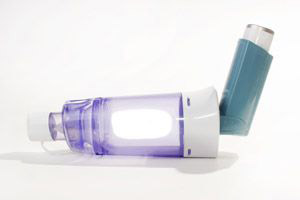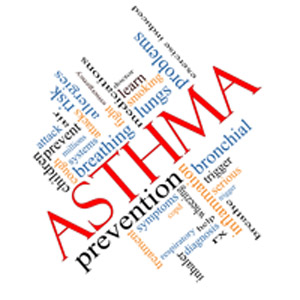
Asthma is the most common chronic respiratory condition that affects children and adults. It has both an inflammatory and a hyperreactive airways component. More than 30 million people in the US have asthma. Most people with asthma have allergies and this assessment is fundamental in our comprehensive asthma care. We now know that smoking and severity of asthma as a child are risk factors for the development of chronic obstructive pulmonary disease, known as COPD. When asthma coexists with COPD, it is now referred to as Asthma COPD Overlap (ACO), and may require additional treatment.Read More
Patients with asthma may experience shortness of breath that may come and go, chest tightness, wheezing or a chronic cough. It can have many different triggers including allergens (trees, weeds, grasses, pets, dust mites), strong scents, viruses, cigarette smoke, cold air, or exercise. There may be other signs of allergies, like watery or itchy eyes, itchy nose, sneezing, nasal congestion in addition to asthma symptoms.
Asthma can be controlled with medications, avoidance of triggers (allergic and not allergic) that are specific to the person with asthma, and a comprehensive and individualized care plan.
The comprehensive evaluation includes:

- Pulmonary function test (PFT) - a test that measures how the lungs are working.
- Peak Flow measurement - in the clinic and also at home.
- Assessment of asthma severity and control.
- Blood work - to assess for allergies and inflammation markers.
- Evaluation of other medical conditions that may affect control asthma, such as rhinitis, sinusitis, reflux, sleep apnea, and stress. Appropriate referrals to subspecialty care are made when needed.
- Other workup for shortness of breath that may be relevant, like heart function, electrocardiogram, among others.
The treatment plan includes:
- Quick relievers.
- Controllers of inflammation - like inhaled steroids.
- Treatment for allergies - antihistamines, other oral controllers, medicines for the nose, when needed, systemic biologicals that target eosinophils or interleukins 5 or IL4/13, referral for allergy shots, and counseling for relevant allergens.
- Smoking cessation - if smoking actively.
- An individualized written asthma action plan - which is a guide as to how to take medications.
- Education that also includes nutrition, exercise and relaxation - the lifestyle modifications needed to empower the person with asthma to decrease inflammation from obesity or stress.
The Tulane Lung Center Integrative Asthma Care approach is the first of its kind in Louisiana. Dr. Nereida A. Parada is the only physician in Louisiana to have trained in pulmonary medicine, critical care, and allergy and immunology. She is also certified in Mind Body Medicine by the Center for Mind Body Medicine in Washington DC, and trained in hypnosis with the American Society for Clinical Research, and American Society for Clinical Hypnosis. She is a co-founder of the Mind-Body Center of Louisiana (https://cmbm.org/), a non-profit educational organization.
The Tulane Lung Center is well equipped to evaluate and manage patients with asthma. If you or your loved one has asthma, please call 504-988-8600 to make an appointment.
Pulmonary Physician
Nereida A. Parada, MD
Useful links to websites that address Asthma:
